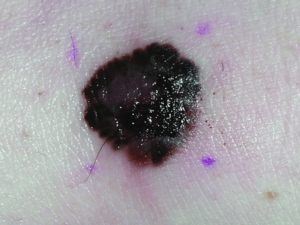The commitment of the NHS and the value they place on screening are not in doubt, although skin cancer is currently not included.
Skin cancers combined are the most prevalent form of cancer in the UK and the most serious form, malignant melanoma, is the 5th most common cancer in the UK. Death rates from this have increased by 150% since the 1970s.
Whilst early diagnosis and treatment bring advantages for most cancers, this is particularly true for skin cancers, with cure rates far higher.
A combination of the above would seem to make introducing a national screening program essential. Not a proposal we wish to disagree with, although the arguments on both sides deserve to be mentioned.
Meeting Core Criteria
In the UK, a national program would be an NHS program. Alongside whether the required funds could be found at all, one of the criteria they would consider is cost effectiveness, which can be quite hard to measure.
They also need to consider likely levels of uptake, if there would be too many false alarms, or missed cases, or any dangers to health due to testing.
A prime issue on all the above is lack of definitive research. A 2019 review of several previous studies summed up the issue, stating that the arguments for national skin cancer screening were neither supported nor refuted by current evidence.
We should however note that a 2003/2004 pilot study in Germany involving substantial numbers did conclude that skin cancer screening would be feasible and effective. They introduced a nationwide screening program in 2008.
Even so, there should be a degree of acceptance that whilst the experience of skin cancer specialists and patients would point in a positive direction, research has not yet provided sufficient evidence.
Taking A Pragmatic View
Science based decisions are generally a good thing in medicine and more research would help but this is not the only basis for conclusions. Neither are some of the counter arguments too rational.
The most common is that skin cancer is visible on the skin, so people usually spot this in plenty of time. Apart from skin cancer not always being visible, the suggestion this is normally spotted in time does not match the outcomes.
Self checking for skin cancer is valuable but identifying them can be difficult. Seeing areas missed, or misdiagnosed by medical staff is not so rare, expecting people, or their families to do better is rather hopeful.
This does however lead us to a stumbling block. Skin cancers are normally well diagnosed by specialists but there aren’t enough to go round and skin cancer screening would be more demanding than other forms of cancer.
A further common argument is that skin cancer is preventable, by avoiding sun exposure. This may be true but what about smoking, drinking, diet, exercise and their effect in other cancers, where we don’t judge.
A Feasible Compromise
Screening would be beneficial in the UK but before this could happen, training and investment in specialist staff, or equipment would be needed.
In the interim, more could be done for those who have had a previous skin cancer, they are not always well supported. Anyone with a genetic disposition towards high risk skin cancers could be given extra support.
This is not so different to the stance currently taken on prostate cancer. Possible symptoms, or just a request to your GP can see testing happen.
Making skin cancer screening a more common occurrence would bring data for use in research. Lives would be saved and during the process, we may confirm scientific evidence to extend the reach.
Perhaps the greatest win from increased screening would be awareness, making skin cancer and screening part of life. This has made a notable difference to other cancers, which a generation ago were barely mentioned.
Skills to increase screening do exist in places across the NHS and as with other testing, the private sector could assist, in a field we know our patients value.



